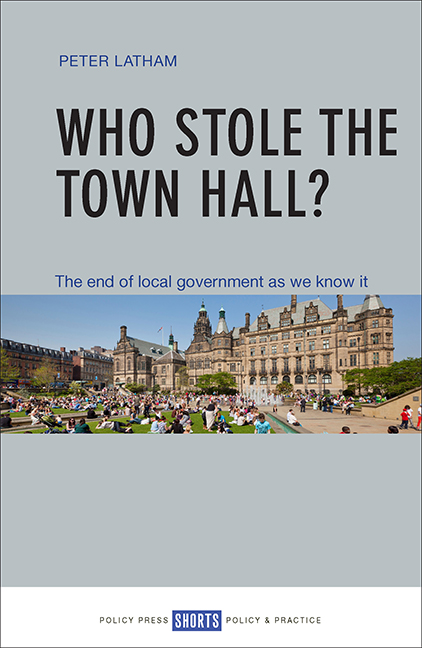Book contents
- Frontmatter
- Dedication
- Contents
- List of tables
- Acknowledgements
- Foreword
- About the author
- List of abbreviations
- Introduction
- 1 The Localism Act, Open Public Services and the neoliberalisation of councils
- 2 Imposed ‘metro’ mayors: new wine in old bottles
- 3 Police and Crime Commissioners: another ‘half-baked import’
- 4 Local government finance
- 5 Towards a new basis for federal, regional and local democracy
- References
- Index
1 - The Localism Act, Open Public Services and the neoliberalisation of councils
Published online by Cambridge University Press: 05 April 2022
- Frontmatter
- Dedication
- Contents
- List of tables
- Acknowledgements
- Foreword
- About the author
- List of abbreviations
- Introduction
- 1 The Localism Act, Open Public Services and the neoliberalisation of councils
- 2 Imposed ‘metro’ mayors: new wine in old bottles
- 3 Police and Crime Commissioners: another ‘half-baked import’
- 4 Local government finance
- 5 Towards a new basis for federal, regional and local democracy
- References
- Index
Summary
This chapter analyses the main provisions of the Localism Act (other than those relating to directly elected mayors and local government finance, which are assessed separately in Chapters Two and Four), the Open Public Services White Paper and the neoliberalisation of local councils.
Governance
The Localism Act 2011 – some of whose provisions apply in England and Wales and some of which only apply in England or Wales – received the royal assent on 15 November 2011 and contains provisions for over 100 orders and regulations in addition to its 483 pages, 223 clauses and 34 schedules. Hence, as George Jones and John Stewart – the leading academic critics of the Act – concluded:
It is ironic that a Localism Act contains so many means by which central government can prescribe how local authority powers are to be used, their procedures developed and criteria to be applied by them … its development has been conditioned by the dominant centralist culture of central government with the result that … [it] could as well have been called the Centralism Act.
(Jones and Stewart, 2012, pp 93–4, my emphasis)The original Bill would have allowed councils to change their governance systems only after the next local election, which in some cases would have meant authorities not being able to make a change (such as returning to the committee system) for as much as three years after the Act came into effect. But, as a result of lobbying by the Local Government Association, all local authorities in England and Wales operating under executive arrangements may now opt to change their governance arrangements following a full council resolution, which takes effect following the council's Annual General Meeting (Latham, 2015, pp 11–13).
Conversely, there is no requirement in Scotland for councils to adopt a particular political decision-making and scrutiny structure, although eight of Scotland's 32 unitary councils have the cabinet system (Table 1.1). Moreover, in Northern Ireland from April 2015 the Local Government Act 2014 reduced the number of local councils from 26 to 11 ‘super’ councils. This Act provides several alternative forms of governance that a council may choose to operate.
- Type
- Chapter
- Information
- Who Stole the Town Hall?The End of Local Government as We Know It, pp. 7 - 42Publisher: Bristol University PressPrint publication year: 2017



